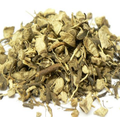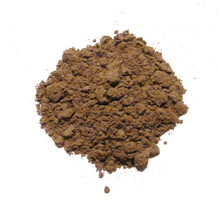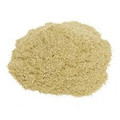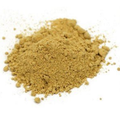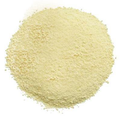 Loading... Please wait...
Loading... Please wait...- Home
- Bulk Herbs
- Herbs (M-N)
- Noni Powder
- Home
- Herbs from Hawaii
- Noni Powder
Product Description
Noni Powder
Wild Crafted - Hawaii
Also Known As – Morinda citrifolia
Overview - Noni is the Hawaiian name for the Morinda citrifolia plant, an evergreen shrub that probably originated in Southeast Asia and has spread throughout Oceania. It is believed that noni was a "canoe plant," so highly prized by Polynesian peoples that they brought it with them as they migrated in their canoes to new islands. As the white noni berry is pungent and bitter, it was only eaten during times of famine. However, Polynesians used the noni berry widely as a dye and to treat wounds, inflammations, infections and other ailments.
The smell and taste of some Noni fruit and juice are unpleasant.
Medicinal Uses - Noni is sometimes known as a superfood because of all its phytochemicals: antioxidants, polysaccharides, flavonoids, fatty acids, and catechins. It contains 17 different amino acids, as well as a significant amount of other nutrients.
1) Antioxidant Powerhouse: Organic noni powder is packed with protective antioxidants, flavonoids, and catechins. These compounds protect cells from oxidative damage caused by free radicals, which helps reduce the risk for premature aging and chronic conditions like heart disease.
2) Immunity-Boosting: Noni is a rich source of polysaccharides which support the body's natural defense system against illness and infection. A study at the University of Hawaii demonstrated that the polysaccharide content of noni juice improves the function of white blood cells in the immune system, which protect the body against diseases. A separate study at the university found that specific polysaccharides, known as noni-ppt, inhibited tumor growth and improved the life span of tumor-bearing mice.
3) Essential Nutrients: Organic noni powder is an excellent source of essential fatty acids and all 9 essential amino acids that our bodies do not produce naturally and must be obtained through diet. Essential fatty acids keep our cells functioning normally and essential amino acids are required to help our bodies make proteins. Additionally, noni powder is an excellent source of vitamin C, dietary fiber, iron, and potassium.
People take noni by mouth for colic, convulsions, cough, diabetes, painful urination, stimulating menstrual flow, fever, liver disease, constipation, vaginal discharge during pregnancy, malarial fever, and nausea. It is also used for smallpox, enlarged spleen, swelling, asthma, arthritis and other bone and joint problems, cancer, cataracts, colds, depression, digestive problems, and gastric ulcers. Other uses include high blood pressure, infections, kidney disorders, migraine headache, premenstrual syndrome, stroke, pain, and sedation.
The fruit juice is used for arthritis, diabetes, high blood pressure, muscle aches and pains, menstrual difficulties, headaches, heart disease, AIDS, cancers, gastric ulcers, sprains, depression, senility, poor digestion, atherosclerosis, circulation problems, and drug addiction.
How does it work?
Noni contains many substances, including potassium. Some of these substances might help repair damaged cells in the body, activate the immune system, and have other activities.
Parts Used -The fruit is used. The powder can be encapsulated, or used fresh as a juice.
Disclaimer - The information presented herein by Mountain Maus’ Remedies is intended for educational purposes only. These statements have not been evaluated by the FDA and are not intended to diagnose, cure, treat or prevent disease. Individual results may vary, and before using any supplements, it is always advisable to consult with your own health care provider.


